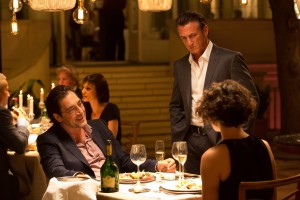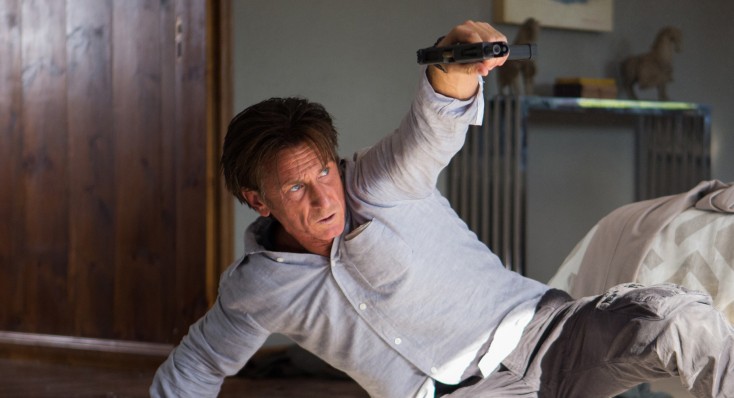
(Left to right) Sean Penn as Jim Terrier and Jasmine Trinca as Annie in THE GUNMAN. ©Open Road Films. CR: Joe Alblas.
By ANGELA DAWSON
Front Row Features
HOLLYWOOD—Wearing an olive green jacket, blue denim shirt and jeans for a press conference, Sean Penn appears to still be in the wardrobe of a former special ops turned assassin, whose past catches up with him in the political action-thriller “The Gunman.”
Though highly admired for his filmmaking and humanitarian work, the two-time Academy Award winner also is known for his outspokenness as well as his disdain for the press. He stepped into controversy again recently at this year’s Academy Awards when he made a comment about “a green card” when announcing Mexican-born director Alejandro González Iñárritu as the winner of Best Picture for “Birdman.” Some immediately decried the comment as a slight to the Mexican immigrant community, even though Iñárritu defended Penn’s comments as an inside joke.
Weeks later, the 54-year-old actor/director found himself once again defending his comment, and questioning the motives of those who complained about it. He also spoke about his action role playing an ex-special forces contractor who is betrayed by the organization he once worked for, and then goes on the run in a high-stakes game of cat and mouse across Africa and Europe. With “The Gunman,” Penn joins an elite group of “older actors” who are finding a second act to their careers playing action heroes. He modestly refers to the genre as “geri-action.”[private]
“The Gunman” is based on the novel “The Prone Gunman,” by Jean-Patrick Manchette and is directed by acclaimed French helmer Pierre Morel, who directed Liam Neeson in “Taken,” which repositioned the acclaimed Irish actor as a bona fide action star. Whether or not “The Gunman” follows the success of “Taken,” and becomes a franchise is up to movie audiences. Penn, who is dating South African born Oscar-winner Charlize Theron, spoke about that possibility and more.
Q: It used to be there were a few guys you went to for an action movie. Thanks in part to Pierre’s film “Taken,” there are now lots of other actors that get to do action movies. Was action ever something you ever wanted to do but it wasn’t available, or was it just this opportunity made you interested in it?
Penn: I’m more of a movie-by-movie actor. I kind of take each one as its own animal. I thought Harrison Ford had made a whole career out of a lot this stuff. I didn’t think it was considered a new trend—what I call geri-action. But there are aspects of this that had nothing to do with that. Admittedly, there’s a tremendous amount of action. One can’t say, “It’s not an action movie,” but you know it’s different kind of movie also because many of these things are kind of wink at the audience movies. There are a couple of those that I’ve enjoyed in a kind of guilty pleasure. This played straight; it wasn’t like that. There were a lot of consequences to the violence and so on and so that appealed to me more.
Q: You’re listed as one of the writers of the script in the credits. What got you motivated to want to take a hand in the writing some of this story?
Penn: Pierre (Morel, the director) and I both kind of travelled similar roads and have similar interests, so when he was busy choosing locations and actors and all that stuff, I was in a room bringing some authenticity to some of the NGO stuff and working with consultants on the military side, because I’d spent a lot of time working on projects with Special Forces, former special forces and private contractors. I wanted to make sure that it could be as close as possible to the reality of it.

(Left to right) Javier Bardem as Felix, Sean Penn as Jim Terrier and Jasmine Trinca as Annie in THE GUNMAN. ©Open Road Films. CR: Keith Bernstein.
Q: You’re also listed as a producer. What does that mean exactly on a film like this where you’re also the star of the film?
Penn: It means I can keep (producer) Joel Silver at bay. (He laughs.) That’s the only reason for it.
Q: How did you like working with co-stars Idris Elba, Ray Winstone and Javier Bardem on this film?
Penn: What can I say? You just named off some of the best actors working, period. We had a great time working with them.
Q: Your combat style in the film is very different from the other agents. How did that all of that come about?
Penn: I was interested in the Krav Maga style of fighting. It’s something I was interested in because I had seen it applied and knew, philosophically, it was different. There was no root in sport. It was much more martial than art. It is the tactical advantages of that and going into the world of those operators. So again, it was an accuracy issue.
Q: Why did you shoot in Barcelona? We don’t see that city depicted in many Hollywood action movies.
Penn: Many years ago (director) John Cassavetes asked me where were we going to make a movie together. It seemed very clear that he had written it for a suburb of New York. But he said, “No, we pick the town with the best restaurants.” Barcelona is that town. It’s diverse and it’s a great place to make a movie.
Q: You’re in great shape in this film. How did you prepare physically?
Penn: There were a lot of preparations for this movie. By the time we got there everything was whatever it ended up being, because your move around a lot and things happen. I don’t like necessarily to talk about training regimens.
Q: How did you get into the mindset of playing an assassin?
Penn: The training is done in a way that’s depersonalizing. In our story, things get personalized as happens in the movie world, so the experience of working as a facilitator in an emotionally detached way (and) using what one has learned or saw is not an unfamiliar thing to me.
Q: What’s your personal view on gun violence?
Penn: The problem with the question for me in the context that it opens up a big complicated issue. The reasons that I didn’t give what my feelings are about guns are a lengthier conversation.
Q: Did you have a special tour guide give show you around South Africa while you were shooting there?
Penn: You’re asking me what did I feel about South Africa or who my tour guide might have been? Here’s the thing. I’m pretending I’m not me for a second and I’m reading something. Do I want to read about whether or not somebody’s girlfriend was their tour guide? I don’t.
Q: How did you like working there?
Penn: We didn’t shoot very much of the film in South Africa. We did a little bit. But at the time I was preparing another film that I was going to be shooting over there and that’s an experience I’m sure I will be talking about when that film comes out. For this film, we were principally in Barcelona and London, and we just did a few days follow up in South Africa.
Q: This movie kind of overlaps your life in the humanitarian work you do. Is that why you took this project as well?
Penn: I’m going to guess that you know that some of it had to do with that and maybe some of the ways in which we approached some of that stuff and what influence I was able to have on that but because we are now in the all-time record breaking humanitarian crisis in terms of displaced people in the world and other issues and conflict. I have a feeling that this is going to be filtering in to a lot of peoples’ filming systems and that more scripts that one reads will have aspects of these stories because they’re surrounding us and affecting us more and more directly all over the world. I think that probably there was the seed of it in there that interested me and I had some personal investment in, but I think is it’s going to become a bit ubiquitous in coming years.
Q: There were some pretty intense fight sequences? Did you get any bumps or bruises?
Penn: Little ones. We got away without anything serious happily. I mean there was an extraordinarily achy body afterwards, but that’s cumulative.
Q: As an actor, how your process has changed over the years? How it developed, is it the same process as it once was, and has your experience informed that change?
Penn: I wasn’t what I would call a natural actor, and learning how to approach material and how to free myself within it. There was an awful lot of work I had to do quite consciously for many years. The more you do it, the more that it becomes an adaptable process, and you become less conscious of it. I like the idea of feeling prepared for a brand new thing so that each movie is that. And one of the things that it affects, especially in film versus on the stage, is the director, because the director’s process is one that you do benefit from being in sync with.
I often think this with Clint Eastwood, who is kind of a jazz musician. He wants all (the actors) to show up and just play it and he wants that to be the take. One person might be able to play this better in another take, but you’ll never have unified magic so you prepare towards that goal or you work with another director and that’s another kind of process and so on. You get to know your director and you’re just able to grab it and go.
Q: Do you work that way as a director? What do you look for when you’re directing actors?
Penn: For me, as a director, the process on each movie is quite different. A lot of that can be because for example some of the movies I’ve worked with much less experienced actors and others I’ve worked with much more experienced actors and you approach it very differently relative to that. I think those were two driving differences.
Q: What was that like portraying that kind of depersonalization in situations where your character has to protect those he cares about?
Penn: It’s an interesting movie in that way because it’s a movie about a very conflicted man killing very bad men largely in service of himself, which is very different. This is why when the conversations about the Liam Neeson (“Taken”) movies. There you have a six-foot four melodically voiced masculine figure who is a very good man fighting strictly for his children. So I don’t really see the comparison.
Q: Do you feel the same way?
Penn: (joking) I thought we were going for “Boyhood.”
Q: At the Oscars, you made a statement about how you’re there to honor movies and not necessarily box office success. Can you talk about how you feel about your own career in this context of where every weekend is what’s number one for the movies, how big is your global total, what is your rating in markets to get movies made?
Penn: I can say that I have about a 35-year perfect history that has immunized me, where if I tried to guess what movie would be popular with an audience, either a movie I saw or a movie I participated in, I would be wrong every single time. It’s not that I wouldn’t invest in the culture of that concern, but I have no skill set for it. I would say I really really really don’t like most of the films that become popular. I feel alienated from the world that embraces them. So that doesn’t help, in my sense of things. I really don’t think about it because I don’t know how to.
Q: Following the Oscars, a lot of people were offended by the green card joke you made before presenting the Best Picture award to Alejandro González Iñárritu. What is your take? I know Alejandro defended the remark saying, “we’re friends,” but a lot of the immigrant community was offended. Do you have anything to say?
Penn: Yeah, I think they could be a little bit more cheerful. My feeling about that is when you identify yourself with fundamentalist thoughts or identity seeking that pursues a common enemy, that you’re very likely to miss irony and that you will render yourself a foolish individual or large groups of individuals and I’m really happy to have them be, because I think what’s most offensive is attaching a protective sensibility to something.
It is actually is meant to create self-censorship in people’s interactions. When somebody as special as Alejandro makes a film as special as “Birdman” was, that if he has a friend onstage who wants to let him know he won privately for a moment, before the room knows, and he did, because there was a history there. So I wanted him to know it first and he did, and that’s who I was talking to, so I don’t give a **** about all that.
Q: This is basically an action film, but there was some laughter in the theater. Are you hoping that when you do something like this that some of the stuff is tongue in cheek and that the audience will appreciate that? Or does that surprise you that I’m saying there was laughter?
Penn: No, I mean I’ve laughed at things that I found out later I wasn’t supposed to laugh at in movies. I mean a movie is supposed to be reacted to by the audience that sees it, not by me.
Q: Concerning what you said about not having a gauge for what would be a hit, are you prepared for this to potentially become a franchise? Is it a role you’d be willing to revisit?
Penn: I’ve never looked at a movie as beyond a movie. I wouldn’t allow myself to think about that. I hope the best for this movie. We worked hard. A lot of people worked hard and invested in it. I have projects I want to direct, and that’s what I’m focused on.
Q: We get to see you surf at the beginning of the film, and you’re still pretty good.
Penn: (modestly) There were a lot of cuts. We had a very short window in which to shoot that in the right light.
Q: Do you still appreciate or enjoy it when you get to act? Or do you see yourself giving that up and just producing and directing at some point?
Penn: When I get on the railroad track on the tunnel I’m going to run as hard as anyone to stay ahead of that train. What’s satisfying is when you’re working with people who are working as hard as you are. If I couldn’t remember what it feels like when it’s done I would never do it again. But it’s a perishable awareness and what happens is that you finish and if you’re proud of the work you did and the relationships, you came away with the affections and respect for the people you work with. That’s the common thing you shared. You think, “Oh that might be nice thing to do again, and then you get there and say ‘What did I do?’” After about 10 years of working in movies, acting got to be a tricky thing for me. (Now) I can enjoy acting only if I’m working with a director I’m in sync with.
Q: You have a climactic scene at a bullfight that you shot in Madrid. Of course, this tradition is considered not politically correct these days and has been banned in Barcelona. What do you think about bullfights?
Penn: I think the tradition is an extraordinary, important thing to respect, but it’s also 2014, and it’s barbaric.[/private]





